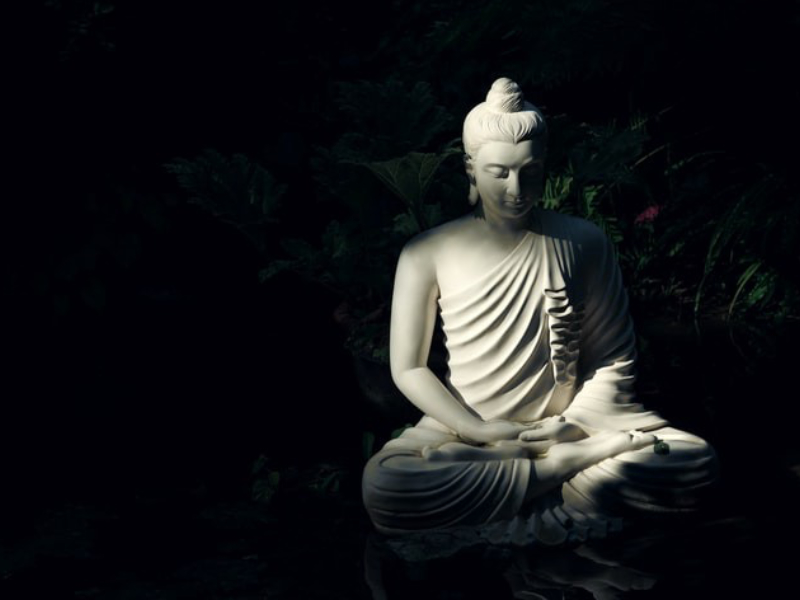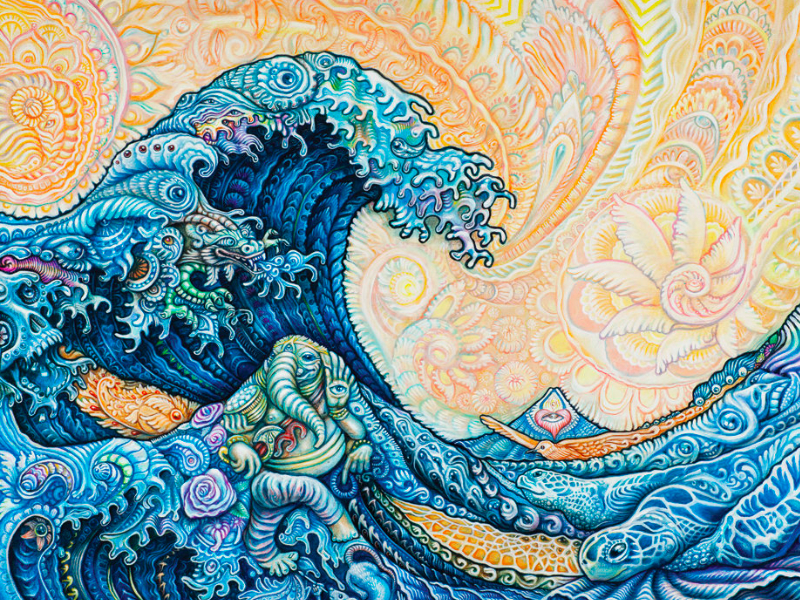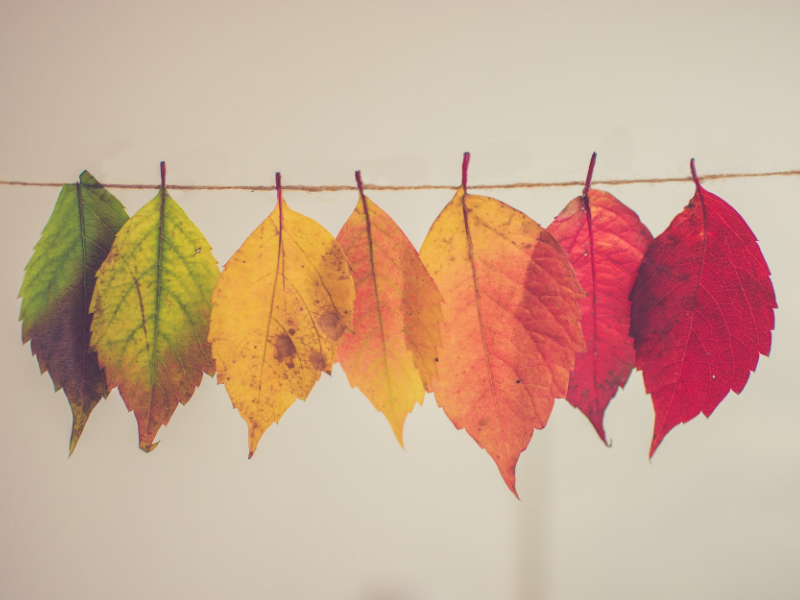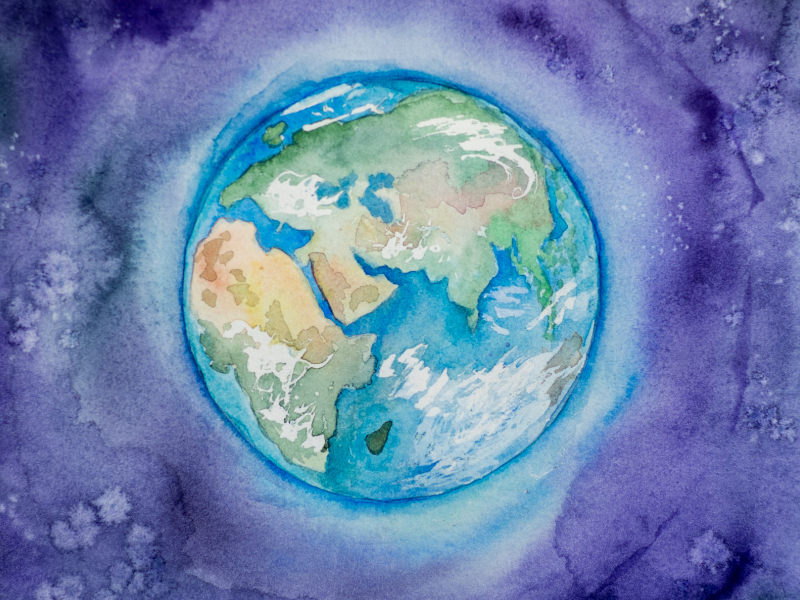Taking What is Not Given
– The Noble Eightfold Path | Right Action –
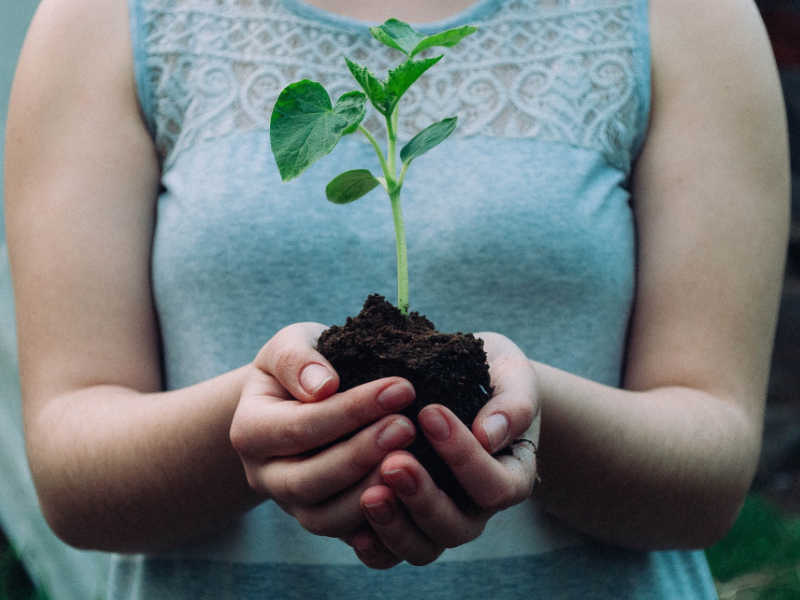
LAST EPISODE WE BEGAN discussing how our actions fit into the Buddha’s Noble Eightfold Path. And because our time was limited, we were able to cover only the first of four precepts — abstaining from causing physical harm.
Today, then, we will pick up where we left off and discuss the next precept.
Abstain From Taking What is Not Given
“Avoid taking what is not given and abstain from it. Do not take away with thievish intent that which another person possesses. And do not take more than what is offered.” — The Buddha
With this precept, I think it will serve us to first address a fundamentally misguided framework or orientation, a kind of posture we take to the world here in the West. That is, we tend to view ourselves as the center of the universe.
Everyone and everything is in relation to us. We move through the world looking at it in terms of what it has to offer us, in what it can do for us. Because of our Judeo-Christian underpinnings, which I believe many people have confused and taken literally, there is this deep-seeded idea that we were put onto this earth, that everything was made, in some sense, for us.
But as Alan Watts said, “We do not ‘come into’ this world; we come out of it, as leaves from a tree.” Ask any of the astronauts who have traveled beyond our atmosphere and witnessed directly the majesty of our blue planet in its fullness, and they will confirm this. They will tell you the earth is a single, living organism. There are no divisions anywhere. You and the earth are of one flesh.
“Abide in me, and I in you. As the branch cannot bear fruit of itself, except it abide in the vine; no more can ye, except ye abide in me. I am the vine, ye are the branches: He that abideth in me, and I in him, the same bringeth forth much fruit: for without me ye can do nothing.” — John 15:4–5 (KJV)
This shift in frame dramatically changes the Buddha’s second precept. With this new understanding or view, we can see that nothing is ours. Everything belongs to the earth. It belongs to the entire collective. We are only borrowing the earth’s resources, for a time, including our very own bodies.
“We are visitors in the fullest sense of the word. You wouldn’t go to a friend’s house for dinner, complain about the food, leave your trash lying around, and walk off with the candlesticks because you wanted them. And yet, this is so often how we treat our world.” — Deborah Adele, Yamas & Niyamas
Non-stealing asks us to live in harmony and reciprocity with the whole of existence. Where stealing is an expression of our greed or envy, our ego-centricity, non-stealing is the expression of love and compassion, our fundamental non-duality. So, really, abstaining from taking what is not given implies more than not stealing. It is an inherent understanding that we are in debt to this gift called Life.
When we really understand this, we can see that when we “possess” or “own” things, we are, in a way, stealing from Life. Now of course, there is utility in property law. I went to law school. I understand that we don’t want to live in a world where we have no claim to our homes, cars, phones, laptops, and other possessions. That would be a total nightmare.
What I am pointing to here runs deeper than the relative level. It exists on the ultimate level, with the direct experiential understanding of our selfless nature. Here, we can’t possess anything. Because, however, we play out our lives on the relative level, we will naturally use language like my house, my car, my phone. We just need to be careful that our language doesn’t distract us from the deeper truth that nothing is really ours. We must remember to keep one hand on the truth, to hold the relative and ultimate together harmoniously. When we do this, we can start to view everything in our ‘possession’ as something very precious on loan to us, as something we ought to take great care of.
When we forget and get lost in the relative world, we succumb to greed, we forget that everything is borrowed, and so we end up stealing in all kinds of ways. You don’t have to look very far to see that our greed has stolen from the other creatures of this planet. We’ve dumped plastics into our oceans, destroyed forest upon forest, replaced more and more of the earth’s surface with concrete jungles, landfills, and commercial crops that destroy the soil.
And what about the future? Aren’t we stealing from it too? Aren’t we stealing from our children and grandchildren? Our consumerism has given us an insatiable appetite for everything. We exist in a giant black hole, which no amount of possessions can fill. There is excess everywhere — excess in our bodies, excess in our closets, excess in our schedules. We’ve forgotten entirely about tomorrow. We live as if there will be no one here after us.
Let’s try to change our focus from what we don’t have to the abundance that is right in front of us. Let us live in the peace and joy of contentment rather than in the pain and emptiness of lack and want. Let us expand not our possessions but our beings by getting in touch with the vast gratitude that is available to us — gratitude for the earth’s resources, gratitude for the gift of life, gratitude for all those who came before us and sacrificed so much, even their lives, so that we could live with more freedom.
“I must study politics and war that my [children] may have liberty to study mathematics and philosophy. Our [children] ought to study mathematics and philosophy…commerce and agriculture in order to give their children a right to study painting, poetry, music, architecture, statuary, tapestry and porcelain.”” — John Adams, Letter to Abigail
“A hundred times a day I remind myself that my inner and outer life depend on the labors of other people, living and dead, and that I must exert myself in order to give in the full measure I have received and am still receiving.” — Albert Einstein
In all the instances where we steal, we make the situation about ourselves, not about the Whole. And it comes from a place of greed and scarcity, both of which ironically impoverish our hearts and minds. One subtle way we see this is when we “trump” or “one-up” people, when we come behind them with a ‘better’ story, usually to buoy our own sinking ego. Observe how you engage in conversation with others. Are you really taking an interest in the other person or are you just looking for ways to boost yourself? When you jump in with your own story, without taking the time to sink into the other person’s story, aren’t you stealing from them in some way? Don’t let your conversations turn into pissing contests, where nobody really cares about what the other has to share. This steals from everyone involved. There is no real ‘sharing’ here, only selfishness, only taking up space and oxygen.
Closely related to this is when we don’t give our attention or appreciation to others. When we don’t pay attention, we can’t see the other person. It is our attention that brings them and everything else into being. Our minds are the space, the homes, of all creation. So, if we strip people of our attention, we are stripping them of their very being. Watch this, especially when it comes to our kids. I can’t express how much we steal from our children when we don’t give them the attention they need, not a spoiled attention, but an attention of true love and care, one that contains the wisdom of ‘no’.What a world it would be if each of our children grew up knowing that they were seen and felt and appreciated.
Another subtle way we steal from ourselves and others is when we enter the comparing mind. By its very nature, with the comparing mind, we step into a dualistic frame, where we intend to put someone or something above or below the other. That is, we take value or worth from someone or something, very often our own. When we compare ourselves to others, we often find scarcity in ourselves, we think we are lacking, which makes us feel cheated. And on the other side, we may find ourselves superior, which leaves us arrogant and makes the other feel lacking. In both cases, though, we are stealing.
“Comparison is the thief of joy.” — Common Saying
Okay, we’ve spoken a lot about stealing from others. But what about all the ways we steal from ourselves? When you impose an outside image of you onto yourself, are you not stealing from the uniqueness, from the very essence of who you are? When you don’t believe in yourself, are you not stealing the vitality and passion from your heart to live and express love freely? When you judge or criticize yourself, are you not stealing from your own self-worth? What about when you live in a constant state of hurry and busyness? Or when you don’t give yourself any time to listen to your heart or digest and assimilate your experiences? Aren’t you stealing from yourself when you don’t allow yourself time to contemplate, reflect, and rest? What about with your stories? Are you telling any stories about yourself that box you in and limit yourself from your full potential? Do you often find yourself the victim, which lends itself only to pity and pain?
Okay, for the rest of the time, let’s explore some antidotes to stealing.
I have already alluded to two of them — gratitude and contentment — which are incredibly skillful means to alleviate the suffering of greed, lack, and want, which sit at the root of stealing. I have discussed many times, in other places, how to cultivate gratitude and contentment, so I won’t go into much detail here. Perhaps I will just encourage you once again to practice insight meditation, which at its core cultivates a mind of contentment by aligning you with the Dharma, how the world is.
But there is one more antidote I want to highlight, one that cuts straight to the heart of our spiritual practice and taps into the boundless wellspring of love within each of us. That is, generosity, the opposite of greed. The power of generosity to open, soften, uplift, and expand the heart is so powerful that the Buddha is said to have begun every public discourse with generosity.
“If you knew what I know about the power of giving, you would not let a single meal pass without sharing it in some way.” — The Buddha
Now, as with all our trainings along the Path, generosity too is a practice. It can be cultivated, developed, and strengthened. And when we do, it can lead to tremendous new levels of peace, non-attachment, and ease.
To begin, it may be prudent to simply open our awareness to generosity, to open to the generosity in the world as well as the impulse of generosity in our own hearts. And to see how this generosity shapes and colors our minds.
Next, especially if you’ve been conditioned to live from a scarcity mindset, you can practice tentative giving. By this, I mean exploring hypothetically giving something away. You might have an old possession you never really use and consider giving it away. See what this does to your heart and mind, even if in the end you aren’t ready to depart from it. I bet you’ll find some joy by tapping into a sense of connection with the person on the receiving end. See if this creates space in your heart, and a sense of expansion in your mind.
Another way to practice milder forms of generosity is to share your things, rather then give them away. Let others share in the enjoyment of your possessions. See what this does to your sense of well-being.
Then, as you grow more comfortable with giving, as you eliminate the sense of scarcity within yourself, you can practice giving freely, and discover the joy in that munificence. Of course this doesn’t mean you need to give everything away. We need to remember to be compassionate and caring toward ourselves too. Rather, simply give where you can without adding unnecessary stress to your life.
Do this and I can guarantee you will discover an abundance within yourself. Continue down this road, and I think you’ll discover more and more that you don’t need a lot of things to be happy. It is our relationship to life, to the Dharma, to change, that determines our happiness or sorrow, not the number of possessions we have. It is witnessing that you are already entirely whole.
And last but not least, practice the giving of yourself. As Kahlil Gibran says, “You give but little when you give off your possessions. It is when you give of yourself that you truly give. For what are your possessions but things you keep and guard for fear you may need them tomorrow?”
With generosity of heart, may you truly be at peace,
More Articles
“The Art of Bare Attention”
Today we’re going to talk about the ancient Buddhist practice vipassana, or insight meditation. Now, just to be clear, this is an entirely secular practice. It doesn’t require you to adopt any dogmatic beliefs…
“The Faceless Seer”
How do you hold your love? Do you hold her from stillness, with nowhere to go, with nothing to do? How do you hold your love? Do you hold her with acceptance, with open hands and arms, with unabashed…
“Everything Changes”
It’s no secret everything changes. Your experience this morning isn’t your experience now. Yet how many of us act like we really understand this? How often do we grasp onto the illusion of things…
“The Divine Connection”
How do you hold your love? Do you hold her from stillness, with nowhere to go, with nothing to do? How do you hold your love? Do you hold her with acceptance, with open hands and arms, with unabashed…

